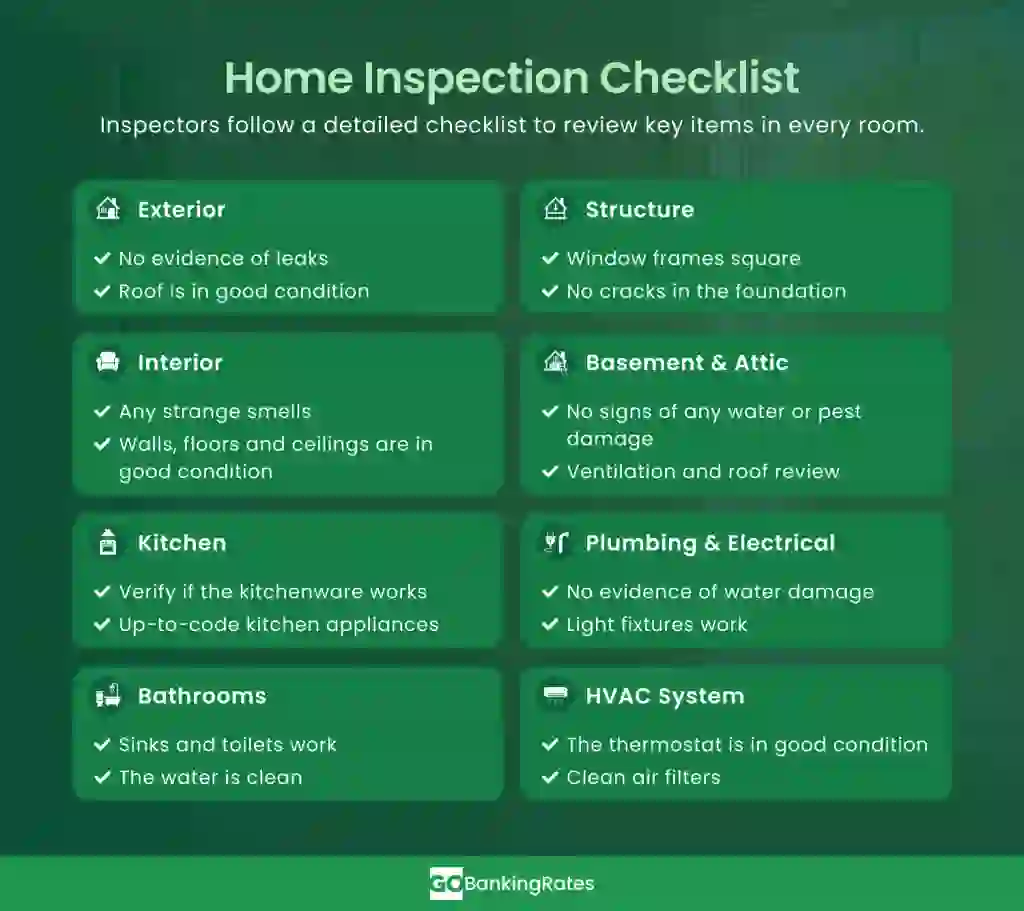Home Inspection Checklist: What To Look for Before You Buy or Sell a Home

Commitment to Our Readers
GOBankingRates' editorial team is committed to bringing you unbiased reviews and information. We use data-driven methodologies to evaluate financial products and services - our reviews and ratings are not influenced by advertisers. You can read more about our editorial guidelines and our products and services review methodology.

20 Years
Helping You Live Richer

Reviewed
by Experts

Trusted by
Millions of Readers
You’ve finally found it: the home of your dreams. It’s perfect, and you can’t wait to move in. Before that happens, though, you need to have a home inspection to make sure there are no significant problems and that the home is worth what you’re paying for it. This guide will reveal what you can expect during the process.
What To Expect During a Home Inspection
A home inspection typically takes two to three hours and happens after the buyer signs the purchase agreement — but before closing. It’s important to have a home inspection contingency in the contract, in case serious issues arise and you need to walk away from the deal.
The inspector reviews every major system and structure, looking for potential safety hazards or costly repairs. You’ll receive a detailed report afterward, outlining what was found.
You should plan on attending the inspection and when you do, bring your home inspection checklist. That way, you can follow along, take notes and ask questions in real time — which most inspectors encourage.
Full Home Inspection Checklist: Room-by-Room Breakdown
Every certified inspector uses a standard home inspection checklist to evaluate the property from top to bottom. Before diving into the details, take a look at this quick checklist of what’s typically reviewed during a home inspection.

Here’s a more in-depth, room-by-room breakdown of what inspectors look for in each area of the home.
Exterior
- No evidence of leaks
- Roof appears well-maintained with no visible damage
- Exterior paint is intact and not peeling
- Septic tank in good condition
- No rotted wood on exterior structures
Interior Rooms
- No unusual odors present
- Ductwork is clean and intact
- Walls, floors and ceilings are free from cracks or stains
- Countertops and cabinets show no major wear or damage
- Insulation is in good condition
Structure
- Window frames are square and seal properly
- No cracks in the foundation
- Ridgelines and fascia straight and level
- House structure is level, with no sagging or bowing walls
Kitchen
- Kitchen appliances are operational and up-to-code
- No signs of water damage, mold or rust
- All drains flow freely without backups
- Cabinets and countertops are sturdy and well-kept
Bathrooms
- All sinks and toilets work
- Water runs clear with adequate pressure
- Tiles are secure and undamaged
- The bathtub and shower are in working order
- Plumbing under sinks is leak-free
Basement and Attic
- No signs of any water or pest damage
- Foundation and substructure appear sound
- Structural beams are intact
- Flooring shows no major issues
- Proper ventilation is in place with no signs of roof damage
Plumbing
- No evidence of water damage
- Sump pumps in good condition
- Water flow and pressure are safe
- No damage or decay under sinks
- The water heater is in good condition
Electrical
- All light fixtures are functional
- Electrical panel shows no damage or corrosion
- Cables secured and protected
- Overcurrent protection is in good condition
- Breakers and fuses are in working order
HVAC System
- The thermostat is in good condition
- Air filters are clean
- Ductwork is secure and unobstructed
- Indoor and outdoor HVAC units are functioning well
- Functioning safety switches
What To Look for When Inspecting a House
Even if you hire a professional, it’s smart to do your own walkthrough first. Look for cracks in the foundation, signs of water damage, roof issues or anything that feels off. These early red flags can help you decide whether it’s worth moving forward before paying for a full inspection.
What’s Not Typically Covered in a Home Inspection?
While a home inspection should uncover any major issues, inspectors don’t check everything. Anything not readily accessible is generally excluded.
Here are some other exclusions, according to the International Association of Certified Home Inspectors:
- Air quality
- Property lines
- Code compliance
- Environmental hazards
- Rodents and other pests
- The life expectancy of any system
- The size, performance or BTUs of any system
- Presence of mold, mildew or fungus
What To Ask During a Home Inspection
It’s natural to have a lot of questions during a home inspection, especially since a home is a significant investment. These are some of the top questions to ask at this stage of the buying process:
- Are any of these issues safety concerns?
- Which repairs are urgent vs. cosmetic?
- How much might these repairs cost?
- How many years do you think it will be before I have to pay for repairs?
- Does the home have any signs of mold or pests?
- Where are the locations of key resources, like the electrical breaker and water shutoff?
- Is this issue major or minor?
- Does the house have any safety hazards?
Who Pays for a Home Inspection?
Usually, the buyer pays for the home inspection.
According to Realtor.com, the average cost of a home inspection is between $300 and $500 for a single-family home.
However, some markets may charge more, and rates vary from state to state. The size of the home is also a factor.
How To Find a Qualified Home Inspector
There are a few reliable ways to find a qualified home inspector:
- Ask your real estate agent: Realtors often work with multiple inspectors and can recommend someone they trust based on experience.
- Check with family and friends: Referrals from people you know can lead you to inspectors they’ve had positive experiences with.
- Search online directories: Use resources like the International Association of Certified Home Inspectors or the American Society of Home Inspectors. These professional associations let you search by ZIP code and provide details about an inspector’s qualifications, experience and background.
If Issues Arise From the Home Inspection
Certainly, if there are safety issues or major issues, you can request the seller to either repair those or give you credit so you can make the repairs yourself. However, some things are not reasonable to ask the seller to address, such as:
- Cosmetic issues
- Nonstructural cracks in concrete
- Nonstructural cracks in drywall
- Repairs to exterior buildings, like sheds
- Landscaping not related to drainage
- Repairs that will cost less than $100
What Happens After the Home Inspection?
A completely squeaky-clean home inspection is very rare. Most houses have at least a few issues. Expect your inspection to uncover a handful of concerns you didn’t notice when you toured the property.
After the home inspection is complete, your real estate agent will go over the findings with you. These are outlined in the report the home inspector gave you. If all goes well and you’re happy, you’ll move on to the closing. If the report uncovers major issues, such as with the plumbing or electrical system, you have a few options:
- Ask the seller to fix the issues
- Ask for credit towards the closing costs
- Negotiate a new price based on the results of the inspection
- Back out of the deal entirely
- Ignore the issues and move in
If a deal falls through because of a failed home inspection, the seller is obligated to disclose this to future buyers. This means owners should be willing to negotiate in one way or another.
Home Inspection Tips for Buyers and Sellers
Home inspections put buyers and sellers on their toes. Knowing how to navigate an inspection can help you secure a better deal. Here’s what you should do depending on whether you’re the buyer or seller.
Buyers
- Invest in a qualified home inspector — it’s worth the extra money.
- Request detailed reports on all key systems in the home.
- Attend the inspection and come prepared with questions.
- Don’t skimp on documentation — skipping on reports now can cost you later.
- Review a standard home inspection checklist for buyers beforehand so you know what the inspector will likely evaluate.
Sellers
- Go over a home inspection checklist for sellers and tidy up the home before the inspector arrives.
- Make the property as clean and inspection-ready as possible.
- Leave the home during the inspection to give the inspector space.
- Be prepared to hear honest feedback — even if it’s not what you want to hear.
- Be available to answer questions or provide details the inspector may request.
Final Takeaway: Use a Checklist To Stay in Control
Having a home inspection checklist helps buyers understand what to look for in a property during the inspection process. Sellers can also use the checklist to modify their houses leading up to the inspection. It’s important to work with a professional, but the checklist allows you to ask more informed questions and discover any issues within the home. That way, the inspection process goes smoother for all parties.
Home Inspections: FAQ
Whether you're prepping to sell or inspecting before you buy, these FAQs can help guide your next steps.- What should I look for in a home inspection?
- You should look at the quality of the appliances and check for any signs of damage. It's good to have a checklist and an inspector so you are prepared.
- What is the biggest red flag in a home inspection?
- Significant structural damage, mold and pests are some of the biggest red flags.
- What usually comes up in a home inspection?
- Issues with structural elements, major systems and water damage tend to come up. However, the main home inspection issues vary for each location due to different climates.
- What is a deal breaker in a home inspection?
- Foundational issues, problems with water or electricity, and a bad roof are some of the deal breakers in a home inspection.
- What are the requirements of a home inspection?
- A home inspector must be allowed to analyze each room in the house and exterior elements without any obstruction. Additional rules vary for each inspector and location.
Gail Kellner contributed to the reporting for this article.
Our in-house research team and on-site financial experts work together to create content that’s accurate, impartial, and up to date. We fact-check every single statistic, quote and fact using trusted primary resources to make sure the information we provide is correct. You can learn more about GOBankingRates’ processes and standards in our editorial policy.
- Quicken Loans. 2021. "Home Inspection Contingency: Why You Need It."
- Total Home Inspection. "Total Home Inspection Checklist."
- Realtor.com. 2022. "How Much Does a Home Inspection Cost?"
- Zillow. "Bad Home Inspection for Sellers: Common Causes and Reasonable Repairs."
- Home Inspection Insider. "What Happens After a Home Inspection."
- International Association of Certified Home Inspectors. "Find Certified Home Inspectors Near You."
 Written by
Written by  Edited by
Edited by 

























